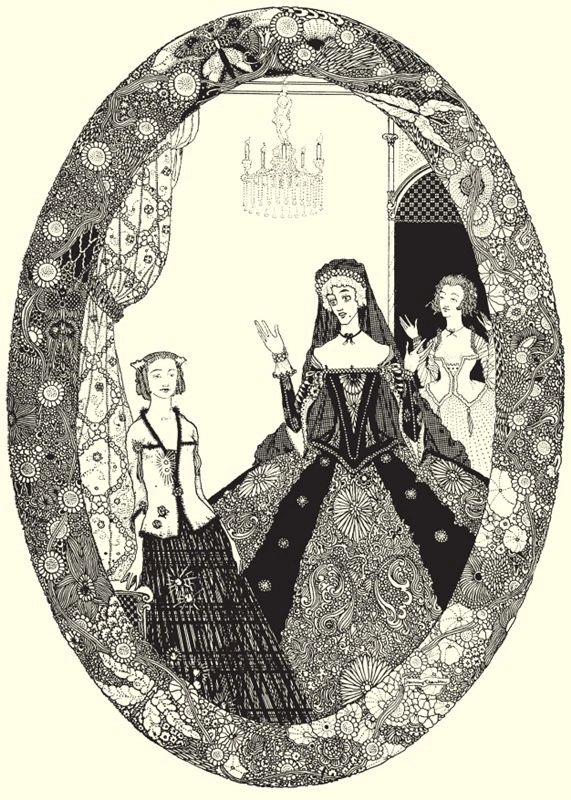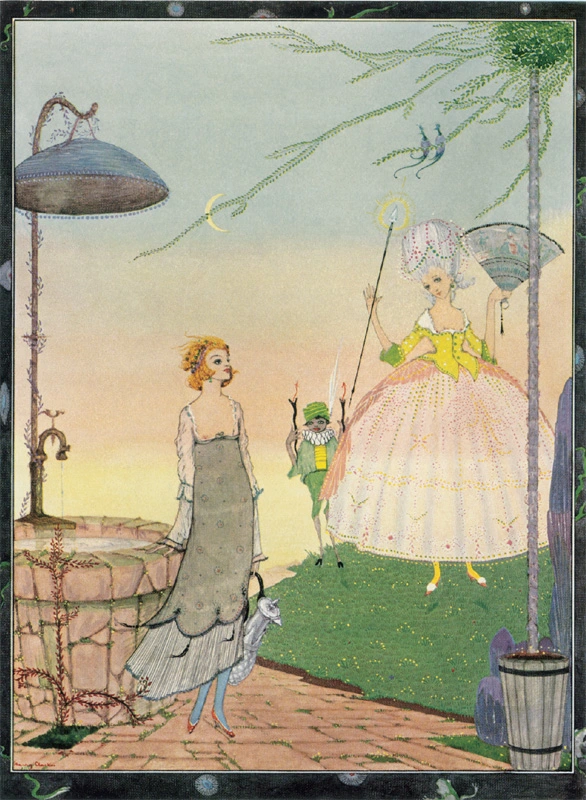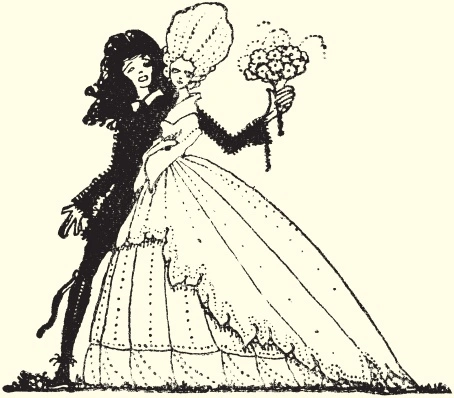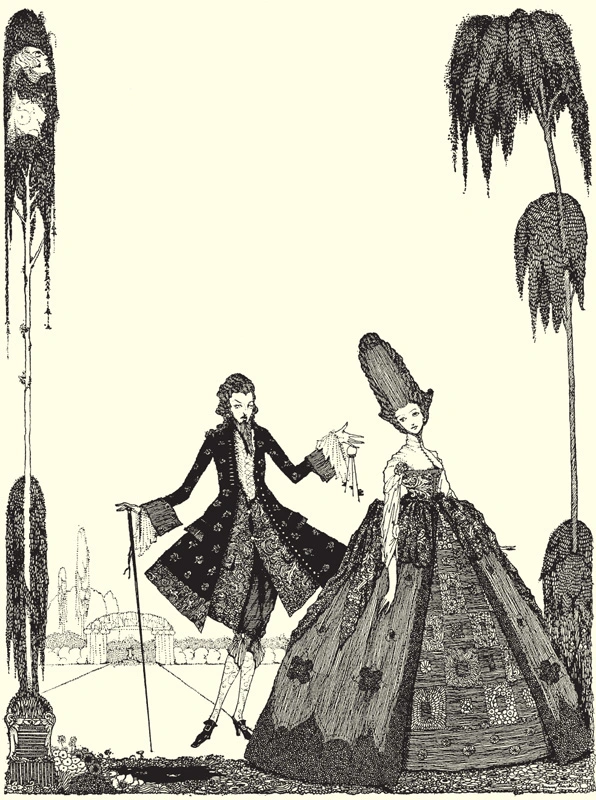The youngest daughter, on the other hand, had inherited her
father’s courtesy and sweet nature, and, as well as that, was one of the most beautiful girls ever seen. As people naturally love themselves, this mother doted on her eldest daughter, and had
a dreadful dislike of the youngest. She made her eat in the kitchen and work all the time.
Among other things, this poor child had to walk over a mile and a half twice a day to draw water from the well and bring home a pitcher full of it. One day, when she was at the well, a poor
woman came to her, begging her to let her have a drink.
“Why yes, with all my heart,” said the pretty girl. She rinsed the pitcher, took up some water from the clearest part of the well and gave it to the woman, holding up the pitcher so
that she would be able to drink more easily.
The woman, having drunk the water, said to her, “You are so very pretty, my dear, so good and so well mannered, that I cannot help giving you a gift.” (For this was a fairy, who had
taken the form of a poor peasant woman to see how far the kindness and good manners of this pretty girl would go.) “I will give you this as a gift,” continued the fairy, “that at
every word you speak, either a flower or a jewel will come out of your mouth.”
When the girl got home, her mother scolded her for staying so long at the fountain.
“I beg your pardon,” said the poor girl, “for being so slow.” When she spoke these words, out of her mouth came two roses, two pearls and two diamonds.
“What is this I see?” asked her mother, quite astonished, “I think I see pearls and diamonds coming out of the girl’s mouth! How is this happening, child?” (You
should know that this was the first time she had ever called her child.)
The poor child told her everything that had happened, not without dropping infinite numbers of diamonds out of her mouth.

“Oh my goodness,” cried the mother, “I must send my child there. Come here, Fanny, look at what comes out of your sister’s mouth when she speaks! Would you not be glad,
my dear, to have the same gift given to you? You have only to go and draw water out from the well, and when a certain poor woman asks you to let her drink, to give it to her very
politely.”
“That would be a fine sight indeed,” said this ill-bred minx, “to see me go to draw water!”
“You will go, you stupid girl,” said the mother, “and you will go this minute.”
So away she went, but she grumbled all the way, and took with her the best silver tankard in the house.
She had no sooner reached the well than she saw a most beautifully dressed lady coming out of the woods. The lady came up to her and asked to drink. This was, you must know, the very fairy who
had appeared to her sister, but had now assumed the guise and dress of a princess, to see how far this girl’s rudeness would go.
“Have I come here,” said the proud, disagreeable girl, “to serve you with water? I suppose the silver tankard was brought purely for your ladyship, was it? However, you may
drink out of it, if you have a fancy.”
“You are not very well mannered,” answered the fairy, very calmly. “Well then, since you have so little breeding, and are so rude, I give to you as a gift, that at every word
you speak, either a snake or a toad will come out of your mouth.”
As soon as her mother saw her favourite child coming back along the road from the well, she cried out, “Well, daughter?”
“Well, mother?” answered the girl, throwing out of her mouth two vipers and two toads.
“Oh, my goodness!” cried the mother, “What is this I see? Oh, it is that wretch your sister who has caused all this; but she will pay for it.”And immediately she ran off
to beat her. The poor child ran away from her and went to the nearby forest to hide herself.
The king’s son, who was returning from a hunting expedition, encountered the girl there, and seeing that she was so very pretty, he asked her what she was doing there all alone, and why
she was crying.
‘Alas, sir! My mother has thrown me out of my home,” she replied.
The king’s son, who saw five or six pearls, and as many diamonds come out of her mouth as she uttered these words, asked her to tell him how that had happened. So she told him the whole
story, and the king’s son fell in love with her; and considering that the fairy’s gift to her was more than any dowry he might receive from someone else, he brought her to the palace of
the king his father, and there he married her.
As for her sister, she made everyone hate her so much that her own mother turned her out; and the miserable wretch, having wandered about for a long time without finding anybody to take her in,
went to a corner in the wood where she died.

“AM I COME HITHER TO SERVER YOU WITH WATER, PRAY?”
THE MORAL
Money and jewels still, we find,
Stamp strong impressions on the mind.
But sweet discourse more potent riches yields;
Of higher value is the pow’r it wields.
ANOTHER
Civil behaviour costs indeed some pains;
Requires of complaisance some little share;
But soon or late its due reward it gains,
And meets it often when we’re not aware.


BLUE BEARD
There once was a man who owned several fine houses in town and country, a great deal of silver and gold plate, embroidered furniture and coaches
that were gilded all over with gold. But this man had the misfortune to have a blue beard, which made him so frightfully ugly that all the women and girls he encountered ran away from him.
One of his neighbours, a noble lady, had two daughters, each of whom was outstandingly beautiful. He asked the lady for the hand in marriage of one of her daughters, leaving her to choose which
one of the two she would give to him. However, neither of the girls would have him, and each said that the other was welcome to him, both of them being unable to bear the thought of marrying a man
who had a blue beard. Another thing that disgusted them and was very off-putting to them, was his having already been married to several wives; and nobody ever knew what became of them.
In an attempt to engage their affections, Blue Beard took the girls, with their mother and three or four ladies of their acquaintance, and several other young people of the neighbourhood, to one
of his houses in the country, where they stayed a whole week. The entire week was spent in an endless round of parties, hunting, dancing, jollity and feasting. Nobody ever went to bed, but spent
the nights playing tricks on each other. In short, everything went so well that the youngest daughter began to think that the beard of the master of the house was not so very blue, and that he was
a very civil gentleman. As soon as they returned home, the marriage between Blue Beard and the youngest daughter took place.
About a month later Blue Beard told his wife that he had to go away on very important business, which would require him to be away from home for at least six weeks. He said that she should enjoy
herself while he was gone, send for her friends and acquaintances and take them to the country, if she pleased, and to be happy wherever she was.
“Here,” he said, “are the keys of the two great store rooms in which I keep my best furniture; these are the keys for my silver and gold plate, which is not in everyday use;
these open my safes, which hold my money, both gold and silver; these are for my caskets of jewels; and this key is the master key to every room. But this little one here is the key to the room at
the end of the great gallery on the ground floor. Open them all and go into each and every one of them, except that little closet, which I forbid you to open, and forbid in such a manner that if
you happen to open it, my anger and resentment will know no bounds.”
She promised to observe, very exactly, everything that he had ordered. Then, having embraced her, Blue Beard got into his coach and set off on his journey.
Her neighbours and good friends did not wait for an invitation from the newly married lady, so great was their impatience to see all the rich furniture of the house – they didn’t
dare to come while her husband was there, because of his blue beard, which frightened them. They went through all the rooms, cupboards and wardrobes, which were all so rich and fine that each
seemed to surpass the previous one.
After that, they went up into the two great rooms, where the best and richest furniture was kept. They were lost in admiration of the number and beauty of the tapestries, beds, couches,
cabinets, stands and tables, and looking-glasses in which you could see yourself from head to toe. Some of these were framed with glass, others with silver; there were both plain and gilded ones,
the finest and most magnificent that had ever been seen. The visitors were unstinting in their praise and in their envy of the happiness of their friend who, in the meantime, was not spending any
time looking at all these rich things, because of her impatience to open the forbidden room on the ground floor. She was so overcome by curiosity that, without taking into account that it was very
impolite to leave her visitors, she went down a little back staircase, and with such excessive haste that she almost fell and broke her neck two or three times.

When she reached the door of the room, she paused to think for some time, remembering her husband’s orders and considering what might happen to her if she were to disobey him. But the
temptation was so strong that she could not overcome it. She took the little key and, trembling, opened the door.
1 comment